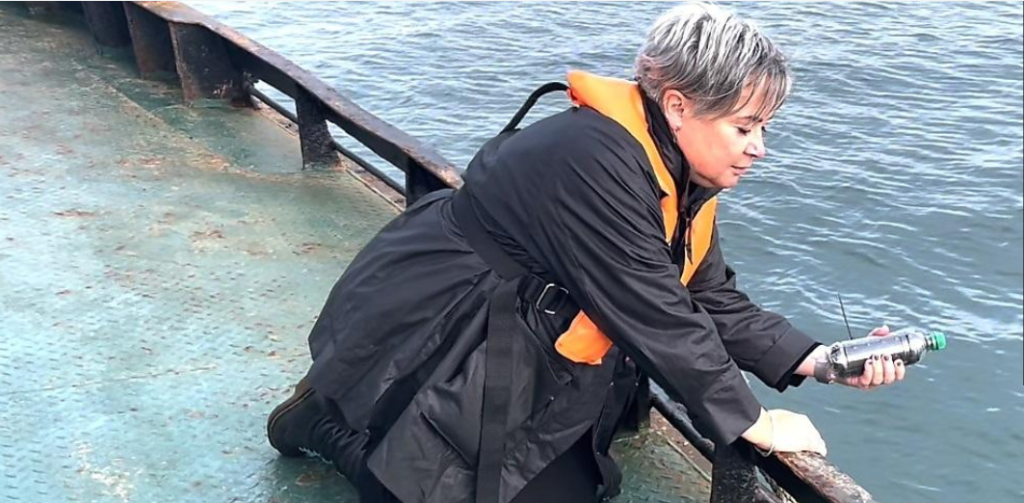- ...
Postgraduate Studentships - Search for funding opportunities.
Postgraduate Studentships - Search for funding opportunities.
Scientists from the University are part of a project deploying plastic pollution tracking devices into the ocean around Scotland
 On the penultimate day of the COP26 conference in Glasgow, scientists from the University of Plymouth are part of a project deploying plastic pollution tracking devices into the ocean around Scotland.
On the penultimate day of the COP26 conference in Glasgow, scientists from the University of Plymouth are part of a project deploying plastic pollution tracking devices into the ocean around Scotland.
The devices will help scientists understand how plastic bottles move in the ocean and their interaction with climate change impacts, wildlife and weather patterns.
The Message in a Bottle tracking project is being run by Arribada Initiative; The University of Exeter; The University of Plymouth and the Zoological Society of London, with support from #OneLess and OneOcean.
Designed to mimic a single-use plastic drinks bottle, the devices will respond to currents and winds as real bottles do.
Stage one of the project launched on World Ocean Day, coinciding with the G7 summit in Cornwall, and has already seen seven devices travel hundreds of miles over the past five months.
In stage two, the four new tracking devices could pass over deep ocean trenches, across major migratory routes for marine mammals and birds, possibly beaching on distant shores.
The devices have been named “Heat”, “Acidity”, “Deoxygenation” and “Pollution” to draw attention to the need to adequately address these ocean crises in tandem and to ensure that a recurring ocean climate dialogue is fundamental to future COPs.
 Dr Phil Hosegood, Associate Professor in Physical Oceanography at the University of Plymouth, said:
Dr Phil Hosegood, Associate Professor in Physical Oceanography at the University of Plymouth, said:
“The bottles released during the G7 have already shown how plastics released offshore readily find their way back to our coastlines. Released off the coasts of Cornwall, they washed up on beaches not just nearby but also in the Channel Islands and France. It demonstrates a strong connectivity between currents in the open ocean and those flowing along our shores and beaches. However, it also shows this isn’t an issue one nation can tackle alone, but that actions taken locally to prevent waste flowing from land to ocean could have a positive impact on our planet as a whole.”
Professor Heather Koldewey of the Zoological Society of London (ZSL) and University of Exeter, lead scientist on the project and Director of the #OneLess campaign, said:
“Through our research we’ve seen that plastic and climate change are fundamentally and intrinsically linked. Plastic is made from fossil fuels, generating greenhouse gasses at every step of its life cycle and the impact of both plastic pollution and climate change are both prevalent around the world. These crises are truly interconnected. There is only one ocean and by tracking the flow of plastics we are trying to demonstrate the connectedness and the wide-reaching impact that humans are having on our planet. There is an urgency to acknowledge that the climate crisis is the ocean crisis.”
Mirella von Lindenfels, Director of the International Programme on the State of the Ocean (IPSO) said:
“The ocean regulates our climate and buffers us from the full force of climate change by absorbing our excess heat and over a third of our CO2 emissions. Any irreversible and significant changes to the ocean could have profound economic and ecological consequences. We have named our new bottles Heat, Acidity, Deoxygenation and Pollution to highlight how these climate-driven impacts on the ocean will affect life on Earth. As new research reveals, climate change cannot be treated independently of the marine plastic crisis, so must be tackled in tandem to synergistically reduce greenhouse gas emissions.”
The launch of the latest group of devices also coincides with COP26’s Cities Day.
The group hopes that this latest data on the movement of ocean plastic will inspire cities across the globe to take steps to curb single-use plastic pollution for the sake of our ocean.
Find out about postgraduate study at the University of Plymouth here

Postgraduate study opportunities at University of Plymouth About us At the University of Plymouth, we are proud to be one of only a select number of ...
Sign up to Postgraduate Studentships
Sign up to compare masters
Thanks for making your selection. Click below to view your comparisons.